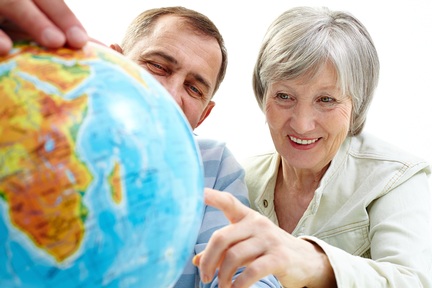UK ranked tenth best country to grow old in
The UK has been ranked tenth out of 96 countries for the best place to live as an older person, but older women are becoming increasingly disadvantaged, according to a global study published by Age International.
The annual Global AgeWatch Index, which measures the quality of life of older people around the world, has revealed increasing inequalities between the top and bottom ranking countries.

Chris Roles, director of Age International, said: “The Global AgeWatch Index allows us to focus much-needed attention on the importance of responding to the rapidly growing numbers and proportion of older people in the world. It shows us which countries are preparing well for this unprecedented demographic change and demonstrates that when governments plan ahead and invest in their ageing populations, society as a whole benefits.”
The Index represents 901 million people aged 60 and over and ranks 96 countries on the wellbeing of older people in four key areas: income security, health, personal capability and an enabling environment.
The research found that countries where the Government invested in the ageing population topped the Index. Western European and North American countries scored highly in all four areas as they offer social pensions, accessible healthcare, flexible working and have created an enabling environment for all ages.
The Index revealed that Switzerland ranked first, with last year’s winner, Norway ranking second place. The UK moved up one place from last year to be ranked tenth, while Afghanistan remained the worst country for an older person to live in.
Furthermore, a gap in life expectancy at aged 60, between top and bottom ranking countries has also widened from 5.7 years in 1990 to 7.3 years in 2012. Mr Roles believes this inequality will continue to grow without more focus on older people and better targeted policies.
Gender inequality has also been found to have increased, particularly for older women. The Index identified that nearly 50 per cent of women aged 55 to 64 are economically active around the world, compared with 73 per cent of men. However, research suggests that women usually earn less than men, so opportunities to save for later life are limited, increasing their risk of poverty in old age.
Age International highlights that by 2050, 46 of the 96 countries in the Index will be classed as ‘hyper-ageing’, with 30 per cent or more of their populations aged 60 and over.
With this in mind, Mr Roles concluded: “With the increasing number of older people and longer life-spans, the urgency for international planners to prepare for ageing populations is growing. Later this month, governments will be signing up to the UN Sustainable Development Goals (SDGs), committing us to universal goals and targets until 2030. These goals provide an excellent opportunity for Governments around the world to think ahead and make the commitments that will improve the economic and social wellbeing of those in later life.
'”Ageing has started to be recognised in the SDGs with the commitment to ‘leave no-one behind’. The Global AgeWatch Index will be a useful tool for measuring the impact of the SDGs on the lives of older people.”
The 17 goals and 169 targets of the SDGs will be adopted at the United Nations at the end of September 2015.
Latest News
 29-Jul-24
Dementia Bus gives carehome.co.uk staff insight into life with dementia
29-Jul-24
Dementia Bus gives carehome.co.uk staff insight into life with dementia
 27-Jul-23
UK's top home care agencies in 2023 revealed
27-Jul-23
UK's top home care agencies in 2023 revealed
 30-Nov-22
A quarter of older people keep their falls secret from family
30-Nov-22
A quarter of older people keep their falls secret from family
 29-Nov-22
'Covid-19 has not gone away' say terminally ill
29-Nov-22
'Covid-19 has not gone away' say terminally ill
 28-Nov-22
IT consultant who received poor care opens 'compassionate' home care business
28-Nov-22
IT consultant who received poor care opens 'compassionate' home care business